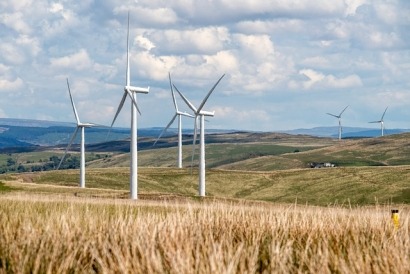
This transaction is a new milestone in Repsol Renewables’ strategy to strengthen its position as a global player in the renewable energy business, increasing its international footprint and contributing to its goal of 20,000 MW of installed renewable generation capacity by 2030.
Based in Houston, Texas, ConnectGen is a renewable developer with a multi-technology approach and full in-house development capabilities, especially in US onshore wind projects. ConnectGen’s development pipeline includes 20,000 MW of onshore wind, solar and energy storage projects at different levels of maturity across the most attractive US energy regions. This pipeline entails the entry of Repsol in the US onshore wind industry, one of the largest and highest growth potential markets in the world.
ConnectGen will also allow Repsol to build on strong renewable capabilities in the US and deep expertise internationally, adding a significant wind power growth platform that complements the solar and storage development capabilities acquired through the purchase of a 40% in Hecate Energy in 2021.
Current ConnectGen employees, including senior management, will join the Repsol Renewables’ team, bringing valuable expertise across the projects’ lifecycles and a deep knowledge of the renewable US energy industry.
“This transaction is another step in our firm commitment to transforming our industry and becoming a zero net emissions company by 2050, while maintaining our profitable growth, diversification and multi-energy focus and ensuring shareholder returns. The addition of ConnectGen accelerates our commitment to renewable generation in one of the markets with the greatest potential for future growth. In that sense, bringing on board its valuable team of experts is key to ensure our successful future growth with robust profitability in the market,” explains Josu Jon Imaz, CEO of Repsol.
Wil VanLoh, Founder & CEO of Quantum, remarked: “Quantum is committed to driving forward the energy transition by building best-in-class platforms in the renewable energy and climate tech space. It has been a privilege to work alongside Caton Fenz (ConnectGen CEO) and the entire ConnectGen team to build one of North America’s leading renewable energy development platforms. All of us at Quantum and 547 Energy are looking forward to watching Repsol convert these development projects into operating assets that will help power the American economy with clean renewable electricity over the next decade.”
The deal is expected to be closed before end of the year, subject to customary regulatory approvals.
Guggenheim Securities LLC served as financial advisor and Baker Botts LLP served as legal counsel to Repsol. Wells Fargo Securities LLC and Nomura Securities International Inc served as financial advisors and Kirkland & Ellis LLP served as legal counsel to Quantum, 547 Energy and ConnectGen.
The significant US renewable potential
The US renewable market is one of the largest and with greatest growth potential in the world. The Global Wind Energy Council (GWEC) foresees that, in total, 60 GW of onshore wind capacity is expected to be added in the next five years in North America, of which 92% will be built in the US and the rest in Canada.
Additionally, the US Inflation Reduction Act has provided new support and long-term visibility for the expansion of renewables in the United States. Based on this policy, it is expected that by 2027 US annual wind and solar photovoltaic (PV) capacity additions double compared with 2021.
Repsol entered the US, following the purchase of 40% of Hecate Energy in 2021. This company specializes in the development of photovoltaic solar and battery projects for energy storage and has a portfolio of projects totaling more than 40,000 MW. Through this agreement, Repsol operates close to 245 MW of solar PV renewable projects in the country: Jicarilla 1 and 2 (125 MW) and 20 MW of Battery Energy Storage System, and 100 MW of Frye (637 MW in total), which is expected to be fully operational in 2024. In addition to Frye, the company has Outpost (629 MW) under construction.
The company’s ambition in the country is to have an installed capacity of 2,000 MW by 2025 and more than 8,000 MW by 2030. ConnectGen brings a new and significant portfolio of onshore wind, PV solar assets and batteries in different stages of development of close to 20,000 MW.
Growing international footprint in renewables
Renewable electricity generation is one of the main pillars in Repsol’s energy transition. The company has built a geographically-diversified renewable business in Spain, Italy, Chile, Portugal and the US, enhancing its capabilities and portfolio and creating a solid platform with a profitable high growth potential, with the ambition of becoming a global operator in the renewable business.
The company’s 2021-2025 Strategic Plan envisages reaching 6,000 MW of installed renewable generation capacity by 2025 and 20,000 MW by 2030.
Repsol has taken significant steps towards reaching those targets in 2023, with the purchase of Asterion Energies, with a portfolio of 7,700 MW of renewable assets under development -4,900 MW of solar PV and 2,800 MW of wind generation- mainly located in Spain and Italy. The multi-energy company also incorporated 250 MW of renewable assets in Spain after reaching an agreement with the developer ABO Wind to purchase three wind farms (150 MW) and two solar power plants (100 MW) at an advanced stage of development. In addition to the start of projects under development in Italy and the progressive commissioning of new facilities in Spain, the United States and Chile.
In total, Repsol already has a global portfolio of more than 2,000 MW renewable energy projects in operation, 3,000 MW under construction and a pipeline in different stages of development in Spain, the United States, Chile and Italy.
To enhance the growth of its renewable business area, Repsol has forged alliances, including the partnership with Credit Agricole Assurances and EIP, a transaction that valued Repsol Renewables at €4,3 billion in 2022, and the inclusion of partners such as Pontegadea and The Renewables Infrastructure Group (TRIG) in solar and wind assets, whom have validated Repsol Renewables’ business model.

